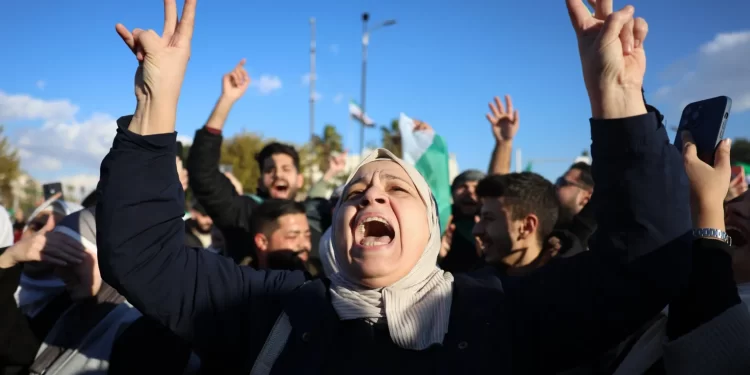Watch: BBC speaks to Syrian rebel leader Ahmed al-Sharaa
When I left London almost two weeks ago after the rebel coalition captured Aleppo – a stunning victory dwarfed by what followed – I thought I would be reporting a shooting war.
The group known as Hayat Tahrir al-Sham, or HTS, was sweeping all before it, but I assumed that the regime would fight, as it did not stop doing as it was losing ground in the years before the Russians intervened in 2015 to bomb Syrian towns and villages to rubble.
Almost a decade later, it was clear that Bashar al-Assad’s Russian, Iranian and Lebanese allies had other wars to think about.
But while the regime struggled with unwilling conscripts, it could always find Syrians who were prepared to fight and die for it, even at the height of the war after 2011, when rebels controlled much of Damascus outside the city centre and the road to Beirut.
I visited those men on the front line many times.
Many of the most effective units were led by officers from Assad’s own Alawite community.
In Aleppo in around 2015 an Alawite general handed out glasses of perfectly distilled arak, poured from bottles that once held Jack Daniels.
Proudly, he said the arak, an aniseed based spirit popular across the Middle East, came from the Assad family’s home town in the hills behind the port of Latakia. Outside, his unit was pounding the rebel-held east side of the city.
Not all were Alawites. In Jobar, a district on the edge of central Damascus, a Christian officer loyal to Assad from the Syrian Arab Army took me into the tunnels they had dug under the ruins to attack rebels.
He told how the rebels also had tunnels and how sometimes they would break into each other’s, killing in the darkness.
The young man had a crucifix tattooed on his wrist and another hanging around his neck, and he talked about how he had to fight to protect his community against jihadi extremists on the other side.
My instincts about the fighting spirit of Assad’s depleted band of loyalists could not have been more wrong.
On Saturday 7 December I went to sleep after hearing the news that Homs had fallen.
By the time I woke up Bashar al-Assad was on his way to Russia and rebel fighters were starting to celebrate on the streets of Damascus.
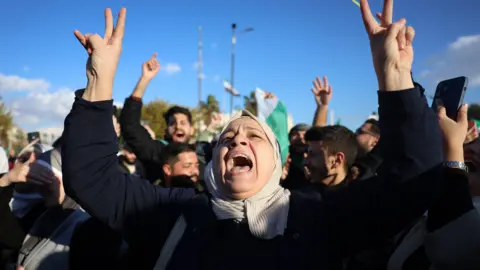 EPA
EPAThey shot more bullets into the air in celebration than they fired in anger at Assad’s loyalists, who were running for their lives.
I saw hundreds of cars queuing to leave at the border with Lebanon, full of disgruntled, defeated men and frightened families.
Rank and file soldiers dumped their uniforms and weapons without firing a shot and went home.
The Assad regime crumpled, hollowed out by corruption, cruelty and brutal disdain for the lives of Syrians. Even Assad’s own Alawite community did not fight for him.
That was why on Thursday evening this week, instead of sheltering from shells and bullets on some freezing street in Homs or Hama, as I’d expected, I walked through the marble halls of the presidential palace in Damascus with Ahmed al-Sharaa, Syria’s de facto leader.
He has given up his uniform, and swapped his wartime pseudonym, Abu Mohammed al-Jolani, for his real name.
Many Syrians doubt his claim that he has also swapped his old jihadist beliefs for a more tolerant form of Syrian religious nationalism.
It is true that he broke with al Qaeda in 2016, after a long career as a jihadist fighter in Iraq and Syria. But as I found in Assad’s palace, Ahmed al-Sharaa, a tall, quietly spoken man in his early forties, is reluctant to get too specific about the Syria he wants.
He comes across as highly intelligent and politically astute. Like many astute politicians, he often does not give a straight answer to a straight question.
He denied he wanted Syria to become a Middle Eastern Afghanistan.
The Taliban, he said, ruled “a tribal society. Syria is entirely different.” Syria’s new rulers would respect its culture and history.
When I asked whether women would have the freedoms they have come to expect here, he said 60 per cent of students in universities in Idlib, his powerbase, were female.
But he tried not to answer a question about mandating hijab – Islamic dress – for women.
Damascus has been buzzing with rumours of bearded HTS men ordering women to cover their hair.
I pointed out that there had been a big row on social media after a woman asked for a selfie with him and then pulled up her hood when she took the photo.
Conservatives criticised al-Sharaa for consenting to pose with a woman who was not part of his family. Liberals saw her hood as a dark omen of Syria’s future.
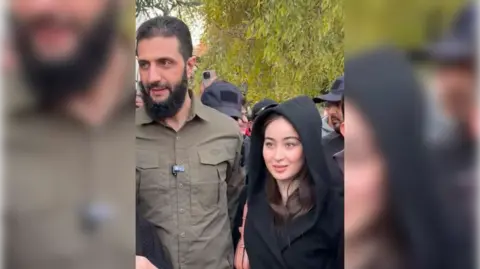 X
XIf he was exasperated by the question he did not show it.
“I did not force her. But it’s my personal freedom. I want photos taken for me the way that suits me. I did not force her. That’s not the same as having a law about it that applies countrywide. But there is a culture in this country that the law needs to recognise.”
Al-Sharaa was referring to the fact that many Syrians, not just in the majority Sunni Muslim community, are pious.
Many women wear hijab. The point, secular Syrians would say, is to be able to choose.
In half a century of Assad rule, Syrians developed survival strategies which often included hiding their own feelings and doing what was expected of them.
Shocked, nervous, secular Syrians showed me videos on their phones of mass prayers outside universities when the students went back last Sunday.
Was it, they asked, real piety or young people doing as they were told because that is how it’s been here for their whole lives?
It will all, al-Sharaa said, be a matter for a new constitution to be decided by a panel of legal experts.
Al-Sharaa’s critics will point out that as things stand, he chooses who gets on to the committee that he says will be writing new laws as well as a new constitution.
Ahmed al-Sharaa wanted to talk most about the old regime’s oppression of the people.
“The Syrian problems are far too bigger than the issues you are asking about. Half the population was kicked out of Syria or forcibly displaced from their houses.
“They were targeted with barrel bombs and unguided dumb bombs and over 250 chemical attacks. Many Syrians drowned at sea trying to escape to Europe.”
He recognised that Syria has no chance of starting to stabilise and rebuild if sanctions are not lifted.
Sanctions were aimed originally at the Assad regime. To keep them, he said, meant treating the victim the same as the oppressor.
He denied the group he leads is a terror organisation, which at the moment is the position of the UN and most of the world’s strongest countries.
Visits by foreign diplomats suggest changing both the sanctions and terrorist listings could be feasible.
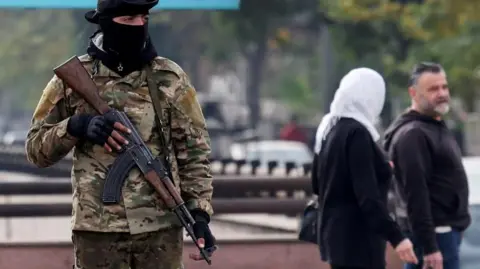 Reuters
ReutersHe was dismissive when I pointed out I knew diplomats had told him that changing that status would depend on proof he was keeping his promise to respect minority rights and run an inclusive political process.
“What matters to me is that the Syrian people believe me. We promised the Syrian people to liberate them from this criminal regime and we did that. This is what matters to me first and last.
“I don’t very much care about what will be said about us abroad. I’m not obliged to prove to the world that we work seriously to achieve the interests of our people in Syria.”
During the last two weeks, I have heard many Syrians say that they want to be left alone to try to rebuild their country.
That sounds like a pipe dream.
The war destroyed much of the country, but it also drained away Syria’s sovereignty.
Bashar al-Assad became a client of Iran and Russia and fled the country when they stopped supporting him.
The US is in the north-east, to hunt remnants of Islamic State and to protect its Kurdish allies.
Turkey controls much of the north-west and has its own Arab-led militia.
There are signs that the Turks, who have a close relationship with HTS, are preparing a renewed assault on Syrian Kurds who have a close relationship with Kurdish separatists inside Turkey.
Israel, currently as aggressive as it has been for many years, has most overtly exploited the vacuum of power it saw in Syria.
It continues to bomb the remains of the state’s military infrastructure and taking more Syrian land to add to the Golan Heights which it has occupied since 1967.
The Israelis, as ever, justify their actions as self-defence.
The UN special envoy to Syria Geir Pedersen told me that Israel’s actions were “irresponsible.” Israel, he said should not act in a manner that could “destabilise this very, very fragile transitional process.”
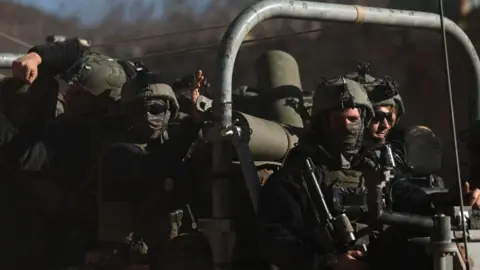 EPA
EPAAhmed al-Sharaa knows he cannot stand up to Israel’s US-backed power.
“Syria is exhausted from the war regardless of whether Israel is strong or not. Syria needs to get stronger and more developed. We don’t have any plans of aggression against Israel. Syria will not be a threat to Israel or anyone.”
Ahmed al-Sharaa’s agenda is overflowing.
Syria is a broken country that he says he wants to repair and revive, full of challenges that might make his task impossible.
HTS is not the only armed group in Syria and there are some that want to destroy his fledgling administration. Enemies of HTS in the Islamic State network might try destabilising attacks.
The desire Syrians have for vengeance against Assad’s killers – and the ex-president himself – could explode into destructive public rage if HTS cannot show that it is bringing to justice the men who kept their boots on Syrian throats for so long.
Ahmed al-Sharaa, correctly, sees Syria as a fulcrum at the heart of the Middle East.
“Syria is an important country with a strategic location, very influential in the world, look how America is present in it on the one hand, Russia on the other hand and regional countries such as Turkey, Iran and Israel as well.”
He says that is why the outside world should help Syria recover.
It is also why powerful states might not let that happen.

